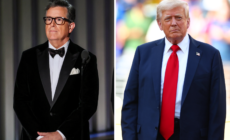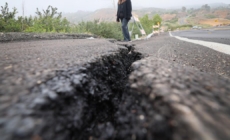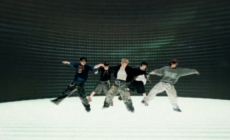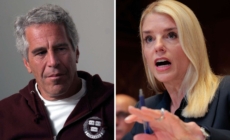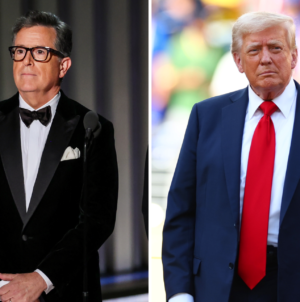-
Was Stephen Colbert’s ‘Late Show’ Canceled Because of Trump? What to Know - 33 mins ago
-
Sweden vs. England Full Penalties Women's Euro Quarterfinals | FOX Soccer - 50 mins ago
-
3 killed in strike on the last Catholic church in Gaza; a friend of Pope Francis is among the injured - 57 mins ago
-
Hungary Seeks to Stay Leading European Hub for Chinese Investment - 57 mins ago
-
Trump wants to hire 10,000 new ICE agents. Is that goal doable? - about 1 hour ago
-
Golden Retriever Realizes He’s on Camping Trip, His Face Says It All - about 1 hour ago
-
Flight cancellations are surging this summer. These airports have been hit the hardest. - about 1 hour ago
-
Candace Parker on leaving Sparks: 'I didn't like who I'd become.' - 2 hours ago
-
Time to ban homes in Rancho Palos Verdes’ landslide zone? - 2 hours ago
-
North Korean defectors chase dreams to debut in K-pop boy band - 2 hours ago
Big Tech’s Catastrophic TikTok Gamble | Opinion
When Oracle, Apple, and Google chose to restore TikTok services after Donald Trump’s Inauguration Day promises, they made what may ultimately prove to be the most catastrophically expensive corporate decisions in American history. These companies are knowingly violating the Protecting Americans from Foreign Adversary Controlled Applications Act (PAFACAA) based on legally meaningless executive orders—exposing themselves to potential civil penalties of up to $850 billion each. The next president, or even the current one should his notoriously mercurial mood change, could effectively bankrupt them all.
What’s most stunning isn’t just the scale of their legal exposure, but the breathtaking corporate miscalculation that led their corporate executives to gamble not just their companies’ very existence but their own personal livelihoods on the political whims of a president who cannot legally protect them from the consequences, or who could change his mind overnight. There is no doubt that each company made this decision despite employing armies of lawyers who undoubtedly informed their executives that presidential promises do not override congressional statutes. They either knew or should have known the consequences of their decision, but in their rush to curry favor with Trump and capture short-term profits, these tech giants may have authored their own financial destruction.
Anthony Kwan/Getty Images
Should they ever be predicated, the legal trap these executives have walked themselves into is particularly damning. They would face a profound dilemma that exposes the fundamental weakness of their decision-making process. If they claim they acted in good faith based on legal advice, they would need to waive attorney-client privilege to make that defense. However, no lawyer of the caliber they command would have advised them that proceeding was a wise decision. This means that waving privilege would force their lawyers to either admit they advised against proceeding with the willful violation of the ban, destroying the good faith claim, or to commit perjury to protect their clients. In short, it means they almost certainly won’t be able to raise this defense.
Without an advice of counsel defense to shield them, shareholders could argue these executives acted recklessly and in bad faith by gambling with existential corporate liability for purely political reasons, making them personally liable for any resulting damages. This entire episode represents a profound abandonment of basic corporate governance principles, specifically the business judgment rule that normally protects executives from shareholder lawsuits when they make reasonable decisions in good faith.
The financial stakes at play highlight the magnitude of their miscalculation. The penalty for violating PAFACAA is a fine not to exceed $5,000 multiplied by each user determined to have accessed the offending website or app. With TikTok’s 170 million American users, each company faces potential fines of up to $850 billion. These aren’t theoretical penalties; they’re concrete statutory fines that any competent legal team would have flagged as existential threats to corporate survival.
The business logic behind these decisions defies rational explanation. The revenue from TikTok-related services, while substantial for Oracle especially, pales in comparison to the potential liability exposure. Even if these companies believed the political risk was minimal, basic risk management principles would demand treating statutory violations as unacceptable regardless of assurances from any political figure.
This episode reveals a troubling pattern in corporate America’s relationship with political power. When faced with clear legal obligations, these companies chose to prioritize political relationships over legal compliance. They gambled that political favor would outweigh legal consequences.
What makes this situation particularly tragic is that it was entirely avoidable. These companies had clear legal obligations under PAFACAA. They had sophisticated legal teams capable of explaining those obligations. They had governance structures designed to prevent exactly this kind of reckless decision-making. Yet they chose to ignore all of these safeguards in favor of personally placating the president.
The ultimate irony is that these companies may have destroyed themselves while trying to preserve their market position. In their effort to maintain access to TikTok’s user base, they have exposed themselves to a liability that dwarfs any conceivable benefit. They prioritized short-term political favor over long-term corporate survival—a decision that future business school case studies will likely examine as a cautionary tale about the dangers of political calculation overriding legal compliance.
Corporate America has long prided itself on sophisticated risk management and legal compliance. The TikTok episode suggests that when political pressure mounts, even the most sophisticated corporations can make decisions that defy basic business logic.
Nicholas Creel is an associate professor of business law at Georgia College & State University.
The views expressed in this article are the writer’s own.
Source link
